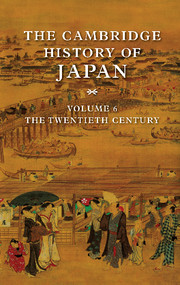4 - Postwar politics, 1945–1973
from PART I - DOMESTIC POLITICS
Published online by Cambridge University Press: 28 March 2008
Summary
Politics in modern society is both a cause and an effect of socioeconomic change. Sometimes it is possible to discern and trace the causal link between the two; that is, a specific political action is seen to cause a specific socioeconomic change, and vice versa. More often, however, the direction of the link is fuzzy and difficult to determine. A political action is seen to result from a set of socioeconomic conditions and in turn to bring about a new set of socioeconomic conditions. The relationship between politics and socioeconomic change in postwar Japan is no exception.
During the twenty-eight years between the summer of 1945 and the summer of 1973, the Japanese society and economy underwent an obvious and far-reaching transformation. On the other hand, politics appear to have changed little, in fact so little that a casual observer might have missed it completely. Upon closer examination, however, it becomes evident that politics, too, underwent a significant change during the period, in a close and complex relationship with the change in the society's socioeconomic conditions. The unstable multiparty pattern that prevailed during the first postwar decade yielded to a short-lived quasi-two-party system in the second half of the 1950s and then to a stable one-party-dominated multiparty regime in the 1960s and 1970s.
It is thus possible, in terms of both socioeconomic changes and shifts in the balance and alignment among the political parties, to divide these twenty-eight years into two distinctive periods.
- Type
- Chapter
- Information
- The Cambridge History of Japan , pp. 154 - 214Publisher: Cambridge University PressPrint publication year: 1989
References
- 2
- Cited by

